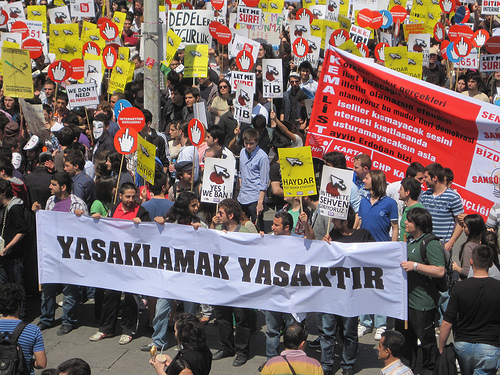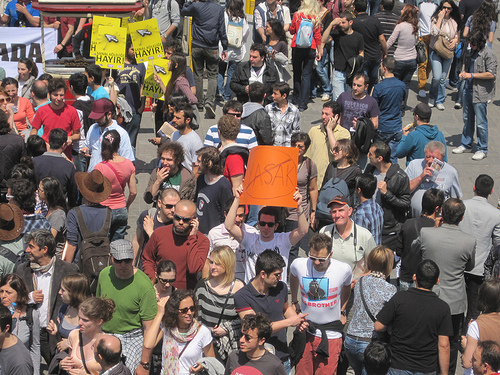Towards “the safe internet”
Online censorship in Turkey #1
Starting today, Mashallah News will publish articles on the topic of censorship during 10 days. We are also hosting a panel discussion on censorship and self-censorship in Beirut on Thursday July 28 at 7 pm: (Self-)Censored, as part of the AltMedia Experience event which is open for all.
From 22 August and onwards, the Turkish government will implement a national internet filtering system. While authorities claim they are building a “safe internet” to protect children and families, civil society actors are rising up against increasing censorship. Mashallah News met with Istanbul Bilgi University Professor of Law Yaman Akdeniz and Turkey’s Reporters Without Borders representative Erol Önderoğlu.
“The problem of internet censorship in Turkey has existed since internet first came to the country.”
What has been the attitude of the Turkish State towards the internet since the 90s?
Yaman Akdeniz: Until 2001, the state had a hands-off approach towards regulation and censorship online. But between 2001 and 2007, the government and courts started to block the access to several websites, for example the PKK site or others which described corruption in the army. In 2005, a new intellectual property law was passed which lead several hundreds of websites, including Megaupload and Pirate Bay, to be blocked due to infringement of copyright.
Erol Önderoglu: The problem of internet censorship in Turkey has existed since internet first came to the country. And the police have always intervened. I remember the website of Idea Politika, a publication run by journalist Erol Özkoray [between 1998 and 2002]. Although there was no law about internet crimes back then, the police went to Özkoray’s office to ask him to suspend his the website because of a court decision. That was arbitrary.
Law 5651 is widely criticized. Can you tell us about it?
Yaman Akdeniz: It took the Turkish parliament only 59 minutes to pass the May 2007 internet censorship law. Earlier that year, in March, the first defamatory videos of Atatürk had appeared on YouTube. The first YouTube ban was issued by a court the same month. At that time, there were also many headlines in Turkish newspapers about child pornography operations. The official reason given to pass this law was that it protects children from harmful content. So, they developed blocking measures based on certain contents. Access can now be blocked by the court, but also by a new administrative body called TIB, which is part of the national Telecommunication Authority BTK.
“It took the Turkish parliament only 59 minutes to pass the May 2007 internet censorship law.”
Erol Önderoglu: And although websites usually get temporarily suspended, temporarily in Turkey often means definitive. There are very few second decisions which cancel the banning. Law 5816, which sanctions insulting Atatürk, was voted in 1951 and has never been amended. For two and a half years, it was used to ban YouTube. The opposition party CHP pushed for the inclusion of crimes against Atatürk in the 5651 law from 2007. Generally speaking, there is no guarantee in the Turkish law that freedom of speech online is protected.
How many websites are banned in Turkey now?
Yaman Akdeniz: In 2008, the TIB administration started to publish the blocking statistics they collected. Between May 2008 and May 2009, the number of banned websites rose from 432 to 2601. Because of critical stories published in the media, the TIB decided not to reveal the official statistics anymore. There is now a website called engelliweb.com, which publishes a list of banned websites in Turkey. Currently, there are around 15.000 websites on that list. And these are only the ones we know of.
“Temporarily in Turkey often means definitive.”
Erol Önderoglu: There are many websites blocked by the TIB, mainly for pornography reasons or gambling. But among the banned ones, there are also information websites or Kurdish websites.
Yaman Akdeniz: Many Kurdish websites are banned, hundreds of them, and nobody is talking about this. It will be much easier to filter them out with the upcoming filtering system.
Many websites are banned due to court complaints from creationist theologian Adnan Oktar. How come?
Yaman Akdeniz: Oktar is what I call a serious litigator. He managed to block access to almost 75 websites. The thing is, he does not want to be criticized on the internet. Nobody talks about him and his views in Turkey. Oktar filed a lot of complaints against atheist websites. He’s also responsible for the two years closing of British biologist Richard Dawkins’ website.
“Currently, there are around 15.000 websites on the list of banned websites. And these are only the ones we know of.”
Erol Önderoglu: And we’re still hearing from Oktar these days. In June, around 50 writers from the Ekşi Sözluk (Sour Dictionnary) online dictionary were called to the police to testify because Oktar’s lawyers had lodged a complaint for so-called insults against religious values. The daily news website Vatan was also blocked for six hours, after one internet user had written a commentary critical of Oktar’s views.
What is the position of the judiciary regarding internet? The institution is divided between Kemalist judges and others closer to AKP.
Erol Önderoglu: I think that they want to censure the internet for different reasons. Since YouTube was censored by a court in Ankara, at least ten other courts have been waiting for their turn to ban YouTube. In Ankara, there are courts which are prompt to protect Ataturk’s memory but also others that are more inclined to ban anything against Adnan Oktar.
“Since YouTube was censored by a court in Ankara, at least ten other courts have been waiting for their turn to ban YouTube.”
Why this decision about the filtering system?
Yaman Akdeniz: The authorities have realized that they won’t be able to block access to everything. They have a capacity problem: you can only do 10-15 websites a day. Because, every time you block access to a website, you need to do a technical assessment. With the filtering system, you no longer need an administrative decision or a court order to include a website in different blacklists. This means that they will be able to do everything more systematically. But filtering technologies are not new. Since the mid-90s, filtering software for personal computers has been developed – child protection software is one such example. What the Turkish government is trying to do now is something completely different: they want to filter websites at the service provider level and make it compulsory for every individual user.
There are four different filtering profiles. What are the details?
Yaman Akdeniz: The four choices are “standard profile”, “family profile”, “child profile” and “domestic profile”. The family filter is a blacklist, but we don’t know what will be included in it. If you read the regulation, everything might be included. The child filter will have a whitelist approved by the BTK, but just like the family filter, it will not be disclosed. The domestic profile is also problematic. It’s going to include only websites hosted in Turkey. It’ll be like a Turkish intranet. You might wonder who’s going to use the domestic profile? The government argues that this is the safest profile because all nastiness comes from abroad. Finally, there’s the standard profile. The authorities say that this will be like internet is today, with the same forbidden websites. Well, it might sound like that, but the regulation also states that not only will they block access to websites but also to IP addresses and port numbers. This way, known peer-to-peer technologies or even Skype might be blocked.
“It’s a very conservative and paternalistic approach, talking about content which they say is against morality.”
Is this an ideological decision?
Yaman Akdeniz: It’s a very conservative and paternalistic approach, talking about content which they say is against morality. But who’s morality are we talking about? My morality is different than their morality. The only thing the government can think about is banning, censoring and controlling. This is how they want to educate people. I also think that, politically, they’re scared of what’s happening in the Arab world, that the Arab Spring might happen here. So, rather than embracing the technology and the medium, they want to control and limit the access. And they use excuses like child pornography, terrorist propaganda or piracy. This way, as far as the government is concerned, you create an internet that is “safe”. But they’re not trying to protect the people, they’re trying to protect themselves.
“The only thing the government can think about is banning, censoring and controlling.”
Erol Önderoglu: The ideology is the following: the state must be omnipresent so that families can keep their children safe. This way, families won’t have to define rules and educate their children in order to protect them. And the government doesn’t want to launch an information or education campaign aiming at families. Instead, it imposes four different filters for its citizens to choose from.
“This is a sign of the government’s frustration.”
A couple of weeks ago, there were lots of talk about the list, released by TIB, of 138 words being banned from domain names. Tell us about this?
Yaman Akdeniz: This is a sign of the government’s frustration. They are trying to find a final solution. So now there’s this list of words, god knows how they compiled it. Apparently, these are words which constantly appear on domain names with porn content. But, then how do you explain the inclusion of names like Haydar or Adrianne? Or words like nefes (breath), yasak (forbidden) or sisman (fat)? There were lots of things written about this list, the controversy even spread to TV. So now, they’ve backfired. They say that it wasn’t meant to be compulsory, that it was just a friendly warning. They tried to defend the list. But it was more than that: it also opened for criminal sanctions against those not complying with its orders.
Erol Önderoglu: It was an arbitrary decision. We really need to be more aware of what’s going on within the state, because if civil society hadn’t criticized this list, it would’ve been implemented. Had it been, no one would have understood why certain websites were banned.
Photos by Jay Cassano.
3 thoughts on “Towards “the safe internet””
Comments are closed.









Latest update: http://www.todayszaman.com/news-252787-turkey-backtracks-on-controversial-internet-filtering-plans.html
The article does not make clear whether or not those who opt out of having an filtering profile will still have to access the Internet through a new BTK infrastructure. The infrastructure is actually the more troubling part of the proposed legislation because it is what would allow for the government to track user’s activities and record if they are using means, such as proxies or DNS, to access currently banned websites.
Thanks for the share!
Nancy.R